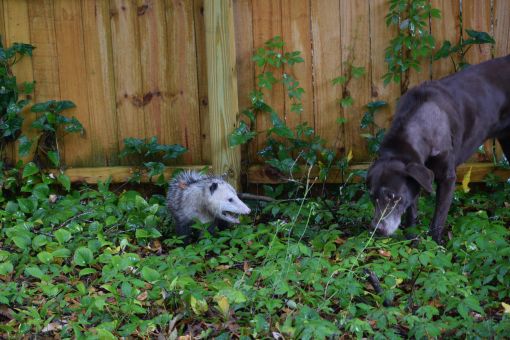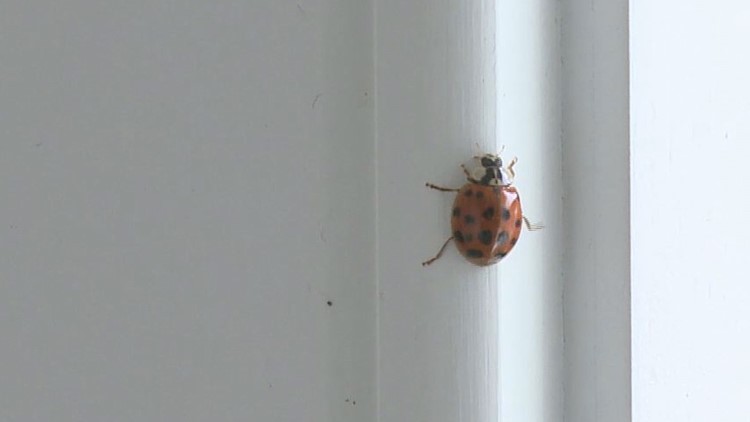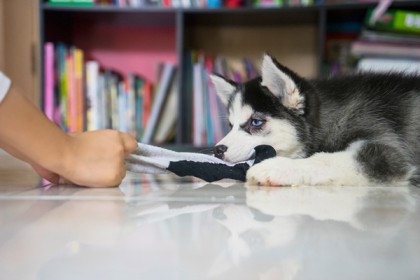
Connect with a verified veterinarian in minutes. Licensed vets are available 24/7 to answer your questions. No need to worry about your furry family member.
Have you ever noticed opossums where you live? You may have seen them at night when they’re out looking for food, or sometimes you may see them dead on the side of the road after being hit during the night.
Dogs are often fascinated with any type of critter they can chase including opossums. Some of our fur babies even have strong prey instincts and will kill an opossum or another animal for invading their territory. But what if your dog eats an opossum?
What is an Opossum?
An opossum is North America’s one and only marsupial! Did you know the opossum is related to Australia’s kangaroo and other marsupials? They are white or gray, have four legs, and have a long, pointed face. Their tail is hairless and similar to a rat’s tail. And they can grow up to 40 inches long.
These critters live in most areas of the US and usually live alone, unless the opossum is a momma. These are nocturnal animals that are hunting and eating overnight.
Opossums are extremely adaptable and can live in a wide range of conditions—from out in the woods and the country, to living in the suburbs and even in the city. Because of their prevalence, opossums can make a fun target for dogs.
What if My Dog Eats an Opossum?
First, you’ll be happy to learn that opossums do not carry rabies. However, they can carry other nasties including the following bacterial and parasitic infections:
- Leptospirosis
- Toxoplasmosis
- Lyme disease
- Coccidiosis
- Trichomoniasis
- Chagas disease
- Salmonella
Each of these can be a very serious illness for your dog (or even you). Your dog could potentially become infected with any of these pathogens if he eats an opossum.
Another concern is that a dead opossum could have died due to being poisoned. This is a problem in some suburbs and cities, where opossums are seen as filthy animals that are destructive. They’re no filthier than any other animal and are beneficial to the environment; however, they can be destructive.

Review symptoms, medications & behavior to keep your pets healthy with a Vet Online in just minutes.
Ask a Vet Live NowWhat to Do if Your Dog Ate an Opossum
If your dog has eaten a dead opossum, then you’ll need to monitor him for any signs of illness or poisoning. If there’s a high probability that the opossum was poisoned, then you’ll need to contact the vet immediately.
Otherwise, eating an opossum may only cause your dog to have an upset stomach, vomiting, and diarrhea. If you’re in any doubt after your dog eats an opossum, then be sure to call the vet. They’ll be the best guide on what you’ll need to do for your dog.
Connect with a verified veterinarian in minutes. Licensed vets are available 24/7 to answer your questions. No need to worry about your furry family member.

Rebecca MacMillan, BVetMed BSAVA PGCertSAM MRCVS
This article has been reviewed and approved by an independent Veterinarian: Rebecca is a companion animal vet who has always had a passion for writing and client communication. Since her graduation from the Royal Veterinary college in 2009 she has gained a wealth of experience in first opinion small animal practice, in both clinical and managerial roles. She currently works in the South West and deals with a variety of routine and emergency appointments, but particularly enjoys medicine cases. Outside of work and writing, she enjoys spending time with her family, including her bouncy flat coated retriever George!
Review symptoms, medications & behavior to keep your pets healthy with a Vet Online in just minutes.
Ask a Vet Live Now





